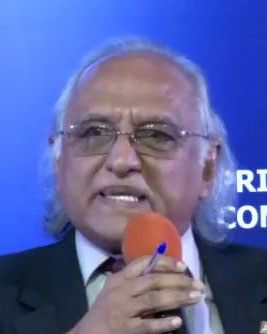Focusing on the foreign exchange controversy, commentator and chartered accountant Christopher Ram has pounded the government over the management of the economy and has called for the exclusion of non-bank cambios and for more banking licences to foster increased competition.
In his oil and gas column in yesterday’s Stabroek News, Ram homed in on the controversy over the shortage of foreign currency and said while it had receded into the background it didn’t mean that the problem had been solved.
He noted that the government’s Model Production Sharing Agreement (PSA) essentially retains the old foreign exchange framework which allows the oil companies to run their own exchange regime, outside of the national matrix.
He said however that the country must not make the mistake that it is all down to the oil companies and that that the extant PSA is the sole cause of the problem or that any fixing of the PSA would solve all the problems.
“Rather, if the Model PSA is a signal, it is safe to assume that the Government does not intend to address the issue of foreign exchange – surplus or shortage – but to leave it to the Bank of Guyana and the so-called market. Perhaps the Government has to be reminded that the Bank of Guyana is a statutory creation, bound to act within the policies set by the Government. The central bank does not make policy but only carries out policies set by the Government. Since neither the Governor of the Bank nor the Government has indicated any change in policy on foreign exchange in response to oil, one has to assume that the Government is comfortable with the status quo”, Ram said.
Such continued inaction on the part of the Government has grave consequences, he warned.
“It has become the victim of the Cambios, the tax evaders, the money launderers and the illegal export of the country’s foreign exchange resources, transfer (under)pricing and the faithful adherence to the foreign exchange rules, already limited as they are”, Ram said.
He added: “This Government has to get around to managing the economy and to address the problems with the economy and the country. Unless it acts soon, the condition can potentially become totally unmanageable and insoluble. Maybe the Government fears that necessary action will not be welcome by their friends and supporters but it must surely realise that it has to act in the best interest of the country rather than in the Party’s electoral interest”.
He listed a number of matters which he said require immediate attention.
He called for the repeal of the Dealers in Foreign Currency (Licensing) Act to exclude the non-bank cambios which he said are almost universally personal cambios, impervious to audit or adequate supervision and regulation. He added that these were created for a different era and purpose and have no place in this society.
Ram urged the issuing of more banking licences, thereby increasing competition among the banks.
He said that there is need for strengthening and enforcing the transfer pricing rules under the Income Tax Act.
“Rigorous enforcement of the laws against those communities of foreigners – regional and international – that rob the revenue of taxes, underpay our workers and take out foreign currency under all forms of guises”, must also be instituted, he said.
“We must not hesitate to place the law breakers before the Courts and to apply our extradition laws in appropriate cases”, Ram declared.
He also called for the addressing of the “large scale smuggling” across the extractive sector and not hesitating to make it possible to revoke leases and licences.
Ram also cited gaping weaknesses in the Local Content Act and the need for the review and amendment of the Bank of Guyana Act and the Immigration Act.
He also called for the strengthening and depoliticising of the Financial Intelligence Unit and the Special Organised Crime Unit.
Ram also wants the government to ensure that foreign investment means what it says.
“Afterall, if the local economy finances the investment, directly or indirectly, allowing the investor to repatriate both capital and profits, the gains to the economy are significantly reduced”, he asserted.
He added: “To state the obvious, managing an economy cannot be only about big spending, sometimes without regard for the Procurement Act, the Appropria-tion Act or the Fiscal Manage-ment and Accountability Act, responsible and accountable spending, and good governance. What kind of democracy is it that the National Assembly has not met since the passage of the 2023 Budget? Is it that the Govern-ment is waiting until it needs parliamentary Supplementary cover for unauthorised spending?”





